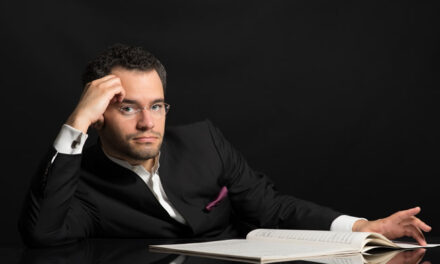There was a good turnout of music lovers in Durham’s handsome Carolina Theatre for the first concert of the Chamber Orchestra of the Triangle‘s 2014-15 season. Music Director Lorenzo Muti always comments briefly about the music from the podium. He said the title of this concert’s program, “America through English Eyes,” was really not apt. Rather it was one of his eclectic menus of music he especially liked. This was the first installment of a six-concert season that features really imaginative programming and interesting soloists throughout.
The concert opened with Florida (Suite for Orchestra) (1887), the earliest surviving orchestral piece by Frederick Delius (1862-1934). Delius grew up in a mercantile family in Yorkshire, England, but he rebelled at joining the family business, wanting to study music instead. Possibly at his father’s instigation, he ended up in Florida to manage an orange plantation. That failed within two years because he focused on music; he became much influenced by the African-American spiritual and improvised four-part harmony. To earn money for his return to England, he taught a plantation owner’s daughters in Danville, Virginia. From his later studies in Leipzig, Delius adapted the approaches of Grieg and Wagner to chromatic harmony. Florida was never published in his lifetime. Sir Thomas Beecham took up the piece, premiered it in 1937, and prepared it for publication in the 1950s; it was printed in 1963.
Florida is descriptive music depicting a day on a plantation by the river. It consists of four movements: “Daybreak,” “By the River,” “Sunset,” and “At Night.” The scoring is remarkably imaginative, with numerous solos for many principal players as well as unusual juxtapositions of sections. Near the end of the third section, a tune resembles “I got plenty o’ Nuthin” from Gershwin’s Porgy and Bess, composed some 40 years later. Among the delights of the last movement was the horn choir accompanied by the harp and pizzicato cellos.
Muti led a beautifully refined interpretation eliciting superb playing from every section of the orchestra. Bo Newsome’s gorgeous oboe playing was prominent in the first and last sections. His breath control and care for color and dynamics was exceptional. There was some technical glitch during the second section that caused a loud blast from the hall’s speakers. This performance was, however, so successful that perhaps Delius’ Paris: The Song of a Great City or Appalachia: Variations on a Slave Song ought to be considered for some future season.
The two greatest settings of poetry for solo voice and orchestra in the 20th century are the Das Lied von der Erde of Gustav Mahler and the Serenade for Tenor, French Horn, and Strings, Op. 31 (1942) by Benjamin Britten, which came after intermission. It was composed while the composer was waiting for the libretto for his opera Peter Grimes to be completed. He conceived the work for the unique voice of his lifelong companion, Peter Pears, and the brilliant horn player Dennis Brain. The composer’s writer friend Edward Sackville-West helped in the selection of the poetry. Lewis M. Smoley’s program notes for Vox Unique’s CD A Serenade to Music describes Britten’s work succinctly. “A Prologue and Epilogue for solo horn to be played in natural harmonic (i.e. without values) provides the framework within which the six poems are presented…. The first poem, Cotton’s ‘Pastoral,’ is set to a simple broken-chord figure in the voice part, echoed by the horn. The ‘Nocturne’ that follows catches all the romantic temperament of Tennyson’s poems, particularly in the imitative ‘bugle’ cadenzas for singer and horn. The setting of Blake’s ‘Elegy’ is no less appropriate. Its two short verses are framed by an orchestral soliloquy in which enormous tension is achieved by a sustained accompaniment in the inner parts.” A grotesque funeral march helps conjure an eerie quality for the setting of the 15th-century anonymous poem entitled “Dirge.” Ben Jonson’s “Hymn” (“To Diana)” is given as fleet a treatment as Mendelssohn might have provided. Keat’s “Sonnet” (“To Sleep”) is languid and rich in coloristic chords. The Epilogue repeats the music of the Prologue from offstage.
Muti led his well-chosen soloists and his string section in a superb and very evocative interpretation. Raleigh native Benjamin Robinson has the perfect tone and timbre for this music. His care for clear diction was outstanding, as was his evoking the emotions within the poems. The New York City resident has been racking up an impressive resume. We look forward to any return engagements in the area.
Unlike his April 20, 2011, UNC Symphony performance, when a natural horn was used for the Prologue and Epilogue, Andrew McAfee used a valved horn throughout. His performance was again simply breathtaking with masterful control of color, dynamics, and phrasing combined with superb intonation.
Muti said he wanted to end the concert with something livelier than meditations upon death, and the Scherzo Capriccioso, Op.66 (1883) by Antonín Dvořák (1841-1904) met the bill in spades! The work has a wide range of moods, by turns dramatic, melancholy, introspective, lyrical, and playful. Like Haydn, Dvořák humorously introduces exuberant themes with melancholy introductions. New themes are often heralded by the horns. The first theme is an odd rambunctious folk-like rhythm later followed by a more wistful waltz-like second theme. An introspective trio section is introduced by the woodwinds. Highlights include an extended solo for bass clarinet and a lovely flute duet accompanied by harp and pizzicato strings.
Muti and his musicians played this piece with plenty of verve with some spectacular work from all sections, not least the brass sections. The fine bass clarinet solo was played by Andrew Warwick while the lovely flute duo was played by Allison Dimsdale and Jill Muti.
The next concert, on November 9, features two lively Rossini overtures, Haydn’s Symphony No. 100, “The Military,” and Beethoven’s Piano Concerto No. 4 with Durham’s own Andrew Tyson. It will be concert not to be missed. For details, see our calendar.











